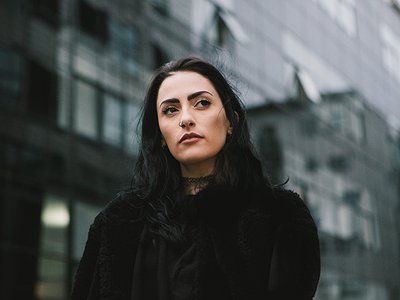Name: Holly Lester
Nationality: Northern Irish
Occupation: DJ, producer
Current Events: Holly Lester will perform at AVA Festival and Conference 2018 (1st-2nd June, Belfast)
Recommendations: The first piece of art I am going to recommend is German composer Nils Frahm’s latest album All Melody. My friend who introduced me to his music took me to see him in concert a few months ago, just as he was starting to tour for this album. It was truly one of the most awe-inspiring shows I have ever been to – I hadn’t felt that moved at a gig in a very long time. Check out the title track and “Sunson”.
The second piece of art I want to recommend is one of my favourite books – “The Alchemist” by Paulo Coelho. Someone who would later become one of my best friends gave me it to read around five years ago. It came at a really influential point in my life and really pushed me to pursue things with music. I don’t want to ruin the story and the meanings behind it but I think its something everyone should read at some point in their lives.
[Read our Nils Frahm interview]
Website / Contact: If this interview with Holly Lester caught your attention, visit her facebook page for further information and to find out where to catch her live.
When did you start DJing - and what or who were your early passions and influences? What what is about music and/or sound that drew you to it?
I started learning to DJ when I was fourteen - after hounding my parents for about a year to buy me some decks, they finally succumbed and bought me a pair of Numark CDJs for Christmas. My earliest influence is my father. He gave me my first proper introduction to electronic music in the form of acid house, ambient, classic trance and breakbeat. I think what drew me to it the most was that it sounded so different from anything else I had been exposed to before. I had never really felt a connection with any music I had heard prior to this. After that happened, it was literally like a drug addiction and I wanted to find more and more. I found it incredible how these tracks could invoke so many strong emotions in me, particularly the trance records. To this day I still get this same feeling with a lot of these tracks.
For most artists, originality is first preceded by a phase of learning and, often, emulating others. What was this like for you? How would you describe your own development as an artist and the transition towards your own voice? What is the the relationship between copying, learning and your own creativity?
The transition for me has been quite a long one, when I think about it. When I first started learning to DJ, I was practising with electro house and progressive tracks. I wasn’t really emulating anyone at this point, simply learning the basics using simpler house tracks. I continued to learn with records like these for a few years, simply because that BPM range was easier for me to learn with. A few years later, I had become obsessed with a few more genres – liquid d&b, jungle, dubstep, minimal and hard dance to name a few. It was almost like I was a sponge soaking up anything electronic and new to my ears. I think most people go through that stage in their teens, where you are just learning so much and taking it all in. For me, this was a very fun part of my life and it wasn’t about having an identity as an artist. Also, because of where I was from, any gigs I played out were all commercial house. So there was a real mix of things coming into play at that period.
It wasn’t until I moved to Liverpool at nineteen years old that I could really begin to develop my style as an underground DJ. I began to get opportunities playing in proper venues and from there I guess that’s where I started to form into the artist I am now. It still took years from that point to reach a stage where I finally felt like I had my identity. Also I think its perfectly natural for your taste to change as you get older (hopefully for the better). I think that the only way to arrive at this point and feel comfortable with who you are is to have copied and learned for some time before. I had to go through the same process when I started learning to make music a few years ago. Eventually things start to click and you aren’t focusing so much on learning. Once this space has freed up in your mind, then there is automatically more room for creativity.
What were some of the main challenges and goals when starting out as a DJ and how have they changed over time? What is it about DJing, compared to, say, producing your own music, that makes it interesting for you?
As I mentioned briefly before, I didn’t have much in the way of credible gig opportunities back at home (I am originally from the countryside in County Armagh). Generally speaking, people aren’t really interested in music that isn’t commercial or country. I was keen to cut my teeth in a club environment, so I just took every opportunity I could. So I guess the first challenge was getting to a city where I could start to play the music I really cared about. There have been plenty of other challenges and bumps along the way. Of course, I have had my fair share of issues as a “female in the industry” and I think that is something that will always crop up from time to time. I prefer not to focus on the negative parts though.
As for goals … that’s another paragraph in itself. Goals will always change and develop along with the artist. In short, the basic goal is to be happy, make others happy with music and be able to live comfortably. It would also be nice to see as much of the world as possible.
DJing is something I have been in love with now for around eleven years, whilst production is still relatively new for me. When everything is progressing in the right way during a set, there is no better feeling in the world. The adrenaline is addictive, as well as the process of actually finding the music to begin with. It’s something I could never imagine being without.
How would you define the job and describe the influence of the DJ? How are the experience and the music transformed through your work?
I think the basic job of the DJ is to bring happiness to people. A DJ's sets or productions can help people through the darkest moments of their lives, in or outside of the club environment. It should never be underestimated how purposeful this form of art really is. I always have this in mind when it comes to my own work and try to reflect this in my music.
What was your first set-up as DJ like? How and for what reasons has your set-up evolved over the years and what are currently some of the most important pieces of gear for you?
So as I mentioned before, my first set of decks were a pair of really basic Numark CDJs. It was actually one of those “all in one” things where you had a two channel mixer and a pair of headphones in the case as well. There were no jog wheels on the decks and no EQ on the mixer! So when I say I could just about learn the basics, it really was just that. I had to learn all over again when I started using Pioneer CDJs. To be honest, the most indispensable thing I own now is my Macbook. Anything else equipment-wise is just a bonus.
Lots of people seem to think that having loads of equipment equates to being a better DJ or producer, which is completely incorrect. Having lots of money to splash on these things does not make you a better artist than the next guy and I think people in the industry need to wake up to this a bit more.
How do you make use of technology? In terms of the feedback mechanism between technology and creativity, what do humans excel at, what do machines excel at?
I keep things pretty simple with my home set up but what I have found is that machines encourage my creativity. It adds a more fun element during the writing process. So in turn, that unleashes more creativity for me. If things get boring and too repetitive, I can quickly loose interest. So in personal experience, it is always good to invest in something to help with this, even something as simple as a midi keyboard. Of course there are a million things that machines excel at over humans in terms of music, but the artist's touch is what makes it music. So neither can really exist without the other.



